Church Operations
Understanding Church Property Ownership: Who Truly Owns the Church?
Introduction
Churches hold a significant place in society, serving as places of worship, community, and spiritual guidance. However, when it comes to the ownership of church property, things can become a bit complex. Who truly owns the church? In this article, we will delve into the different aspects of church property ownership, exploring various examples and contexts to shed light on this intriguing topic.
I. Legal Ownership of Church Property
1. Vicar/Rector Ownership:
In many cases, the legal ownership of church property is vested in the vicar or rector. They are entrusted with the spiritual and pastoral care of the congregation and are responsible for managing the church’s affairs, including its property.
2. Members/Parishioners Ownership:
In some cases, especially in Protestant churches in the United States, church buildings are generally owned by the members themselves. These members contribute financially and take active roles in the administration and maintenance of the church property.
II. Church Organizations and Property Ownership
1. Larger Organizations:
Some churches belong to larger organizations that own the land and buildings. This is often the case with denominations or church networks that have established hierarchical structures.
2. Presbyterian Church Example:
The Presbyterian Church is an example of a larger organization that owns church properties. The local churches are typically governed by a board of trustees, elected by the congregation, who manage the property on behalf of the larger denominational body.
III. Historical Contexts of Church Property Ownership
1. Catholic Church Accumulation:
The Catholic Church has historically accumulated vast amounts of property. Factors such as the prohibition of selling church property and the patronage of noble or wealthy individuals contributed to this accumulation during the Middle Ages.
2. Catholic Church Land Ownership:
It is estimated that the Catholic Church owns millions of acres of land worldwide, making it one of the largest non-governmental landowners. These vast land holdings include properties used for religious purposes, agricultural activities, educational institutions, and more.
IV. Church Property Ownership and Taxes
1. Tax Exemptions:
Churches and religious organizations often enjoy tax exemptions granted by governments. These exemptions help maintain the financial sustainability of the churches and support their mission. However, the issue of tax exemptions for religious organizations can be a topic of debate and discussion.
2. Public Funds Allocation:
The taxes that churches are exempted from paying are intended to be used for various public services, infrastructure development, and other government-funded initiatives. The question arises as to whether these tax exemptions are fair and equitable for society as a whole.
V. Challenges and Controversies Surrounding Church Property Ownership
1. Church Property Disputes:
In some cases, disputes arise over the ownership of church property. This can occur due to conflicting interpretations of governing documents, changes in church affiliations, or disagreements among members. Legal proceedings may be required to resolve these disputes.
2. Financial Transparency:
Transparency in church finances and property ownership can also be a contentious issue. Some individuals or groups may question the financial practices of churches, especially those with significant property holdings. Calls for greater financial transparency have emerged in recent years.
Conclusion
The ownership of church property is a multifaceted subject that varies depending on the denomination, location, and historical context. While legal ownership often rests with the vicar or rector, some churches are owned collectively by their members or affiliated with larger organizations. The accumulation of vast church properties by institutions such as the Catholic Church has historical roots. Tax exemptions for churches provide financial support but can raise questions about fairness. Disputes and controversies surrounding church property ownership are not uncommon, requiring legal processes and transparency initiatives to address them. Understanding the intricacies of church property ownership can help foster dialogue and promote equitable stewardship of these cherished places of worship.

